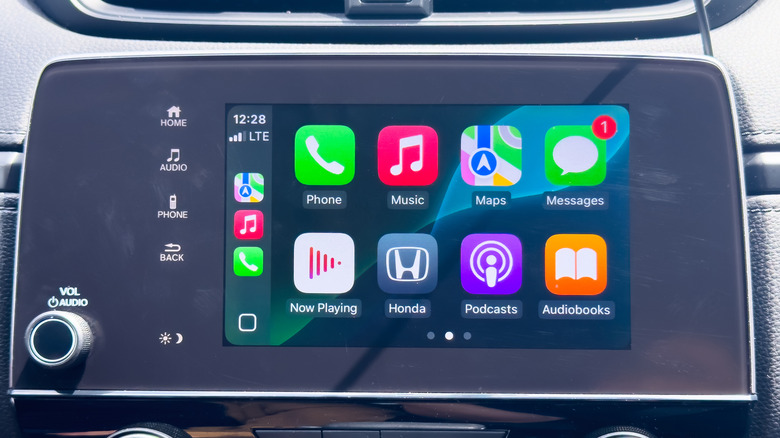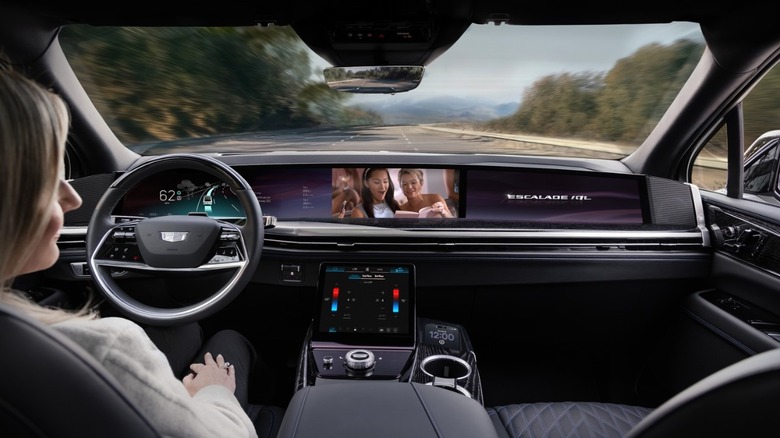Gemini Comes To GM Vehicles As CarPlay And Android Auto Are Phased Out
Gemini is coming to GM vehicles starting in 2026. It's an interesting development that's actually more of the cherry-on-top of a lot of big changes coming to GM vehicles in the next couple of years. Most notably, the company says that it will be moving toward using its own built-in vehicle infotainment system in all its vehicles instead of relying on phone projection systems such as CarPlay and Android Auto. This means all future GMC, Chevrolet, Buick, and Cadillac vehicles will eventually move away from supporting those systems.
Phone projection has become an increasingly useful piece of technology for consumers in recent years, with many cars even taking strides to support CarPlay and Android Auto wirelessly, where they previously required users to connect their device to the system using a wired connection. Early this year Apple even launched a more advanced version of its phone projection system, called CarPlay Ultra, which integrates more of the car's systems into the experience.
However, with companies like GM looking to move away from phone projection altogether — instead looking to rely on their own built-in systems with access to apps and experiences that users need — CarPlay and Android Auto might not be as ubiquitous in the years to come.
Moving toward its own custom system
In the short-term, not much is set to change. While GM plans to eventually phase CarPlay and Android Auto support from its vehicles entirely, that time is likely still a few years off, with the company telling The Verge that it plans to extend the change from EVs to its gas-powered vehicles after its new centralized computer platform launches in 2028. It has been removing CarPlay and Android Auto from its EVs since 2023.
However, the company plans to rely more on Gemini going forward, with GM sharing in its announcement that it plans to bring conversational AI functionality to its infotainment system. The goal is to allow drivers to speak with their car just like they would with a passenger. This is already somewhat possible with Gemini in Android Auto, but it sounds like GM wants to train it specifically to work with what its cars offer instead of simply relying on AI voice assistants that are trained to listen for other, non-related keywords.
While Gemini is expected to start arriving next year, the rest of the changes will take longer, as GM has over 40 models across its various car brands. That means it will need to roll out these changes slowly, with the company's CEO noting that it will likely rely on major launches of those vehicles and brands to help usher in the new age of its custom infotainment system.
The start of a trend?
The real stakes, though, come into play when you start thinking about customer satisfaction. With current phone projection systems, Apple and the Android phone manufacturer are the ones with access to the data and information. This has sparked some speculation that GM is just doing this to increase the amount of data it can collect about its users.
GM removing these familiar systems, and instead forcing users into a proprietary system, feels like a step backward for consumer ease-of-use, as CarPlay and Android Auto work as extensions of systems consumers are already used to. With a custom system, they'll need to learn everything again. Additionally, all of the functionality that an AI chatbot like Gemini bring to the table can already be enjoyed through Android Auto, while Apple is expected to expand AI functionality in CarPlay as Apple Intelligence develops.
But at the end of the day, the "why" doesn't really matter. GM might be one of the first major car manufacturers to make the play to cut out CarPlay and Android Auto, but it's likely only a matter of time until others follow suit. In fact, Ford recently announced a more in-depth digital experience for its vehicles, complete with built-in apps for music, navigation, and more. Based on the way it's advertised, it seems clear Ford wants users to rely more on its SYNC infortainment system than typical phone projection systems, though Ford will continue to support CarPlay and Android Auto. At least for now.


